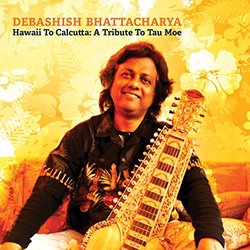| All Artists: Debashish Bhattacharya Title: Hawaii To Calcutta: A Tribute To Tau Moe Members Wishing: 0 Total Copies: 0 Label: Riverboat Release Date: 1/27/2017 Album Type: Import Genres: International Music, Pop Styles: Pacific Islands, Hawaii, Tributes Number of Discs: 1 SwapaCD Credits: 1 UPC: 605633010022 |
Search - Debashish Bhattacharya :: Hawaii To Calcutta: A Tribute To Tau Moe
 | Debashish Bhattacharya Hawaii To Calcutta: A Tribute To Tau Moe Genres: International Music, Pop
The story of the Hawaiian slide guitar?s arrival in India is every historian?s dream ? a twisting tale of great wonder and subtle mystery. Hawaii To Calcutta: A Tribute To Tau Moe is Pandit Debashish Bhattcharya?s dedicati... more » |
Larger Image |
CD Details
Synopsis
Product Description
The story of the Hawaiian slide guitar?s arrival in India is every historian?s dream ? a twisting tale of great wonder and subtle mystery. Hawaii To Calcutta: A Tribute To Tau Moe is Pandit Debashish Bhattcharya?s dedication to Tau Moe, veritable musical folk legend and one of the first to introduce the instrument to India?s enthusiastic shores. Tau (1908 ? 2004) was born in Samoa and raised in Hawaii. With his wife and children, Moe travelled the globe for over sixty-one years, undertaking an unbelievable odyssey and igniting leftfield musical fires wherever he fared. Tau originally worked as a steel guitar player at the Royal Hawaiian Hotel. In 1927 whilst working at said Waikiki establishment he met Rose Kahou, a singer and dancer. Tau and Rose married and shortly joined Madame Riveiere?s Hawaiians with which they toured to Manila. Within two years, the couple had broken away and were billing themselves as The Tau Moe Family. Their early adventures took them to Japan, China, Southeast Asia, Philippines, Indonesia, Pakistan, Burma and of course India. It was in Calcutta that they would light the musical torch that Debashish Bhattcharya still holds high to this day. The Moe family lived in India for several years, performing, teaching and collaborating with local musicians all the while. Tau?s mellifluous slide guitar vernacular was indelibly popular with Indian audiences and musicians alike. The former attracted to the group?s undoubtable musicianship, perceived ?exoticism? and no doubt leaning on a global interest in colonial Polynesia and the then contemporaneous fad for ?Tiki? culture. The latter, learned pandits and their curious students saw the slide guitar as a new vehicle for raga: an instrument able to traverse the sinuous microtonalities of Indian music?s finest frontiers. In 2004 Debashish took his second trip to Hawaii and performed in Laie where Tau Moe then lived. Debashish describes the meeting best; ?Papu Tau was in his nineties. Even after being away from India for almost sixty years, he spoke beautiful Bengali ? He shared with us many stories of his amazing life and gave me his blessing. As long as I live that meeting will remain one of the highlights of my life?. Tau Moe?s vibration resonates deeply through the central chakra of this album as we hear Debashish?s musical genius playfully and gymnastically stretch across popular Hawaiian repertoire. ?Aloha ?Oe? is one of the most widely circulated songs in Hawaiian history. Composed by Queen Liliuokalani in 1878 on visiting the Maunawili mountain ranch, the love song is here reinterpreted by Debashish and Bobby Ingano in pitch-bending languorous splendour. Seemingly misnomered ?Hawaiian War Chant? is an upbeat and peppy number. Written by Prince Leleiohoku II in the 1860s, this track also known as ?Kaua I Ka Huahua?i? became popular again in the 1940s as a swing jazz number. Debashish is joined here on ukulele by Benny Chong, one of Hawaii?s most highly regarded musicians and arrangers. Debashish?s interpretation of ?E Ku?u Morning Dew? written in the 1970s by Eddie Kamae spotlights the gentle rootsy end of Hawaiian style. The rendition features Debsahish?s brother Subhasis on percussion and Jeff Peterson on accompanying guitar. Unfolding the casing of this album, sonic luxuries for the listener surely await. This record was captured during Debashish?s many visits to Hawaii in the company of his dear friends and musical conspirators. Revel in auditory melisma, as Pandit Debashish Bhattcharya immerses himself in great tribute to Hawaii, the golden land of the slide guitar.

 Track Listings (11) - Disc #1
Track Listings (11) - Disc #1